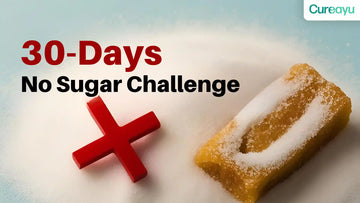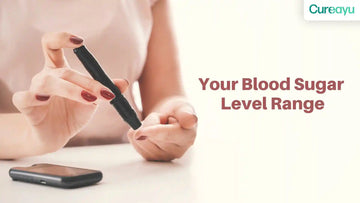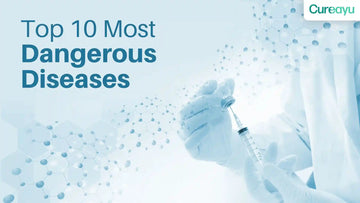In a world where sugar sneaks into nearly every processed food, it's becoming increasingly difficult to maintain a healthy diet without it. From flavored yogurts to salad dressings and breakfast cereals, added sugars are almost everywhere. While natural sugars found in whole fruits are generally harmless when consumed in moderation, the problem lies in the added sugars that contribute to serious health conditions over time.
That’s where a 30-day no sugar challenge comes in. It's not about cutting every form of sugar from your diet, but specifically eliminating added sugars to reset your metabolism, retrain your taste buds, and regain control over cravings. For many, this challenge results in significantly better blood sugar regulation, sustainable weight loss, improved heart and liver health, and more radiant oral hygiene. While the journey may be challenging, the outcomes are deeply rewarding.
Also Read: Understanding the Limits and Health Impact of Sugar Consumption
What Does Sugar Do To Our Body?
Consuming excess added sugar can affect your body in numerous negative ways:
-
Blood Sugar Spikes: Regular sugar intake causes insulin spikes and dips, which can lead to insulin resistance — a precursor to type 2 diabetes.
-
Weight Gain: Sugary foods are high in empty calories and increase hunger, causing overeating and fat accumulation.
-
Heart Disease Risk: High sugar diets increase blood pressure, inflammation, and triglyceride levels — all major risk factors for cardiovascular disease.
-
Liver Damage: Excess fructose is processed in the liver and can lead to non-alcoholic fatty liver disease (NAFLD).
-
Tooth Decay: Sugar promotes bacterial growth in the mouth, producing acids that erode enamel and cause cavities.
-
Skin Problems: Sugar contributes to inflammation, which can result in acne breakouts and premature aging.
-
Mood Swings: Fluctuating glucose levels often lead to irritability, fatigue, and even anxiety or depression.
What is a 30-Day No Sugar Challenge?
The 30-day no sugar challenge is a personal health experiment where you eliminate all added sugars from your diet for 30 consecutive days. This includes obvious culprits like candy, sodas, and baked goods, as well as hidden sources in processed foods, sauces, and flavored drinks.
The goal is to train your body to function without sugar spikes, retrain your taste buds, and help you make more conscious food choices. You’re encouraged to eat naturally sweet whole foods, such as fruits, while avoiding refined sweeteners like high fructose corn syrup, cane sugar, and even artificial sweeteners. By the end of the challenge, most participants report reduced cravings, better blood sugar stability, and improved energy levels.
Also Read: How To Reduce Sugar Level Home Remedies: Natural Ways to Manage Blood Sugar
Benefits of Not Eating Sugar
Blood Sugar Control
Removing added sugar reduces the load on your pancreas and improves insulin sensitivity. This leads to more stable blood sugar levels throughout the day. Individuals with prediabetes or type 2 diabetes may notice a dramatic improvement in their glucose readings, which lowers the risk of long-term complications.
Body Weight Management
When you eliminate sugar, you naturally reduce your calorie intake and decrease insulin levels, both of which promote fat loss. Sugar is addictive, and cutting it out reduces cravings and emotional eating, which are common causes of weight gain. People who complete the challenge often report losing several pounds by the end of 30 days.
Heart Health
Reducing added sugar lowers triglyceride levels and blood pressure, both critical for a healthy heart. Sugar also increases LDL (bad) cholesterol and promotes inflammation, which can harden arteries. By going sugar-free, you protect your cardiovascular system and improve blood flow.
Liver Health
Fructose is primarily metabolized in the liver, and too much can cause fat buildup, leading to non-alcoholic fatty liver disease. Eliminating added sugar helps your liver recover, reduces inflammation, and supports detoxification processes, resulting in better overall liver function.
Oral Health
Sugars are a primary food source for harmful mouth bacteria. Cutting sugar helps prevent tooth decay, gum inflammation, and plaque buildup. People often notice fresher breath, less plaque, and reduced sensitivity after a sugar detox.
Also Read: The Life-Changing Benefits of Not Eating Sugar for a Healthier, Happier You
What Can Be the Alternatives for Sugar?
You don’t have to sacrifice sweetness entirely. Here are natural, healthier sugar substitutes:
-
Stevia: A zero-calorie plant-based sweetener that doesn’t affect blood sugar levels. Ideal for teas, coffees, and baking.
-
Monk Fruit Extract: Naturally sweet and calorie-free, monk fruit is a great choice for those with diabetes or on a low-carb diet.
-
Erythritol: A sugar alcohol that tastes similar to sugar with almost no effect on blood glucose. It’s perfect for baking and low-carb recipes.
-
Fresh Fruits: Whole fruits offer natural sugars along with fiber, vitamins, and antioxidants. Berries, apples, and bananas can satisfy your sweet tooth without a sugar crash.
-
Cinnamon & Vanilla: These spices add sweetness and depth to recipes. Cinnamon also supports blood sugar control, making it a functional alternative.
-
Dark Chocolate (70%+): A healthier indulgence with less sugar and more antioxidants. A small square goes a long way in satisfying cravings.
How To Control Blood Sugar Naturally?
Eat Balanced Meals
Pairing complex carbohydrates with protein and healthy fats slows down digestion and prevents sharp blood sugar spikes. Aim for whole grains, legumes, lean meats, nuts, and plenty of vegetables.
Exercise Regularly
Physical activity boosts insulin sensitivity and encourages muscle cells to use more glucose. Just 30 minutes of walking or moderate cardio a day can significantly stabilize blood sugar.
Stay Hydrated
Drinking enough water helps flush out excess glucose through urine and keeps your metabolism efficient. Aim for 8–10 glasses per day, or more if you're active.
Manage Stress Levels
Chronic stress raises cortisol, which directly affects blood sugar levels. Practice mindfulness, breathing exercises, yoga, or journaling to lower stress.
Consider Natural Supplements
Some herbs can support blood sugar regulation. One such trusted supplement is:
Cureayu Madhumeh Har – Herbal Diabetes Supplement for Balanced Blood Sugar
Crafted with Indian herbs like Indian Kino Tree, Ashwagandha, Gudmar, Bael, Karela, Guggul, and Turmeric, Madhumeh Har supports your body’s ability to manage glucose naturally. It promotes insulin secretion, boosts metabolism, and helps reduce the risk of diabetes-related complications. Ideal for those looking for a long-term, natural way to balance their sugar levels while improving digestion and overall vitality.
Final Words
Taking on a 30-day no sugar challenge can be a powerful reset for your body and mind. It's not just about cutting out sweets—it's about regaining control over your health, understanding your food better, and breaking free from the cycle of cravings and energy crashes. Whether your goal is to lose weight, regulate your blood sugar, or simply feel better in your skin, the benefits of not eating sugar speak for themselves.
Stick with the process, stay mindful of your choices, and don’t be afraid to explore natural alternatives and supportive supplements like Madhumeh Har. Your body will thank you for the effort, and you may find that 30 days is just the beginning of a healthier lifestyle.
FAQs
1. What happens if you don't eat sugar for 30 days?
You’ll likely experience reduced cravings, more stable energy levels, improved focus, better sleep, weight loss, and a noticeable improvement in overall health.
2. Is it OK if I never eat sugar?
Yes, your body does not need added sugars to function. It can derive all required glucose from complex carbohydrates and whole foods.
3. Can I eat fruit on a no-sugar diet?
Yes, whole fruits are allowed in most no sugar challenges as they contain natural sugars along with fiber, vitamins, and antioxidants.
4. Is no sugar harmful?
No, avoiding added sugar is beneficial. However, completely eliminating all forms of sugar, including natural ones, may not be necessary or advisable.
5. Is honey better than sugar?
Honey is slightly better due to its trace minerals and lower glycemic index, but it is still a form of sugar and should be consumed in moderation.











